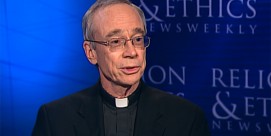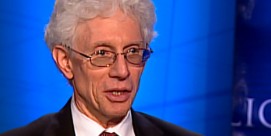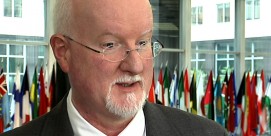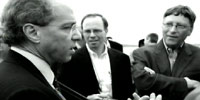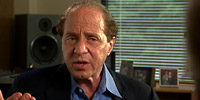In This Episode << SLIDE LEFT TO SEE ADDITIONAL SEGMENTS
Madeleine Albright Extended Intreview
Read more of Kim Lawton’s interview with Madeleine Albright about religion and foreign policy:
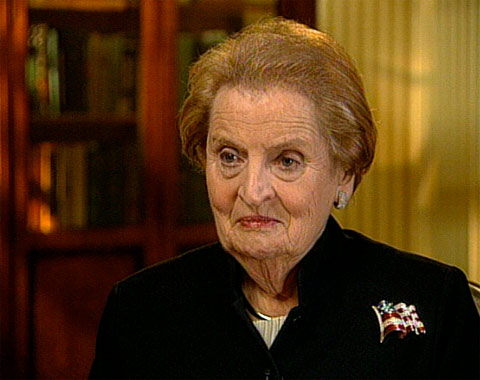 Q: You open your book with observations about the prevailing thought among diplomats that religion and politics, religion and policy should be kept separate. You said, “Diplomats in my era were taught not to invite trouble, and no subject seemed more inherently treacherous than religion.” Why did you change your views about that?
Q: You open your book with observations about the prevailing thought among diplomats that religion and politics, religion and policy should be kept separate. You said, “Diplomats in my era were taught not to invite trouble, and no subject seemed more inherently treacherous than religion.” Why did you change your views about that?
A: Because I think that in looking at what was going on in the world, it was evident that religion and the force of religion and people’s interpretation of how they saw God really [are] very much a part of international relations. It’s true that it’s very complicated. On the other hand, I think if you leave out a whole element of what is going on, you miss the opportunity to try to resolve differences and try to solve some problems. Now, the thing that I’ve come up with, really, is that rather than keeping religion and religious leaders out of things, we need their help. I don’t think we can give up traditional diplomacy, but we ought to be looking at other ways, especially since 9/11.
Q: What was it about 9/11 that contributed to your thoughts on this?
A: Well, I had begun to think about it before and, clearly, when I was secretary [of state] there were issues. When we were looking at — if Jerusalem were just a real estate problem, we would have resolved it a long time ago. But when you’re dealing with parties, both of whom believe that the land was given to them by God, it certainly is something that you have to take into very close consideration. Or in Sudan. Children from Christian schools came to see me about what, at that stage, was the north-south conflict in Sudan. But 9/11, I think, crystallized so much for everybody. When somebody is flying airplanes into buildings and killing innocent people in the name of God, it makes you question why do they have that interpretation and somebody else has another interpretation, and how many people of Muslim faith would agree with that, and what are the different aspects of different people’s religions that is so divisive, rather than being unifying? It’s a subject that I obviously thought about before, but 9/11 in all its horror really crystallized a lot of it.
Q: What are you recommending that policy makers do with religion? What are some of the practical suggestions for ways religion can be factored into decisions?
A: Well, first of all, I think that there are some process issues involved in this. Our diplomats are very well trained, and they are very capable. But they have not really focused on religion per se as a subject of study. It’s one thing to study culture and languages and to understand the environment into which you’re going. But I think that people– the diplomats themselves need to be better versed in aspects of the religious interplay within the countries where they’re going, because, for the most part, there is not just one religion or just one interpretation of a religion in a particular country where they’re going. I think the secretary of state should avail herself or himself of religious advisors. What happened when we were in office was that I actually had an ambassador for religious affairs, Bob Seiple, who had been very involved in various religious activities before. There also was the International Religious [Freedom] Act that created a commission that wanted the State Department to follow what was happening in other countries in terms of religious tolerance. But Ambassador Seiple was a great resource for me, in addition to being a wonderful person, in terms of explaining different issues, of being able to give a different view of particular conflicts. So I think that there need to be more religious advisors. A secretary of state has economic advisors and arms control advisors and environmental advisors. And so I would advocate having religious advisors that are complementing all the other advisors and very much be a part of the process of learning and deciding what the possibilities are in a particular country. And then there are more issues to do with substance in terms of what religious leaders can bring to the table on a specific issue: their knowledge — they themselves — of issues. I think they could be used prior to negotiations at high levels among different parties, and some of the processes that they’ve already invented themselves: the Cordova process, in which all three religions talk to each other, or the Alexandria process, which is based on the concept that there can be some agreements on the most troubling issues in the Middle East. And then have religious leaders validate some of the decisions that have been made after negotiators have finished. So I think there’s more and more of a role for religious leaders in helping on substantive issues, and more of a role in terms of process, of deciding how to approach a problem by better education on religious issues of our diplomats.
Q: No doubt many religious leaders would love to have input on policy decisions. How can those voices be part of the process, and how should they? There are lots of religious leaders with lots of different opinions. What is the appropriate way for that to happen?
A: You have to begin by actually knowing who the religious leaders are within each of the major religions, what their relationships are, the people they influence. This is not seeing religious leaders in terms of what they are doing with the people that they work with religiously. I mean, this is not trying to get into what they preach, but trying to understand how they relate to people that they can bring into the process themselves. I mean, it’s more of a political thing, if I might put it that way, and so one needs to know what their role is within their communities and whether they can not only impart knowledge to the decision makers, but then take back some ideas to their people. But it’s not easy. We would have to begin, really, by having a better understanding of the communities that people operate in, to know what kind of people they are; try frankly to find people within all the religions who are those who are representing the conciliatory approach, who are not extremists, who can explain what the extremists are doing, but are those within the religions who are the ones interested in interpretations that help promote understanding. I don’t want to kind of denigrate the importance of religion as I describe this. But it’s like any political process of trying to find people that can help you, that have good contacts at the grass roots, who understand what the problems are and are able to convey those to the decision makers, and then take the results back to the communities.
Q: You mention validating decisions. Is there a fine line between offering moral guidance in a particular policy area and giving a blessing of some sort to policies that are enacted, so policy makers can look for people who think like they do and who will give their blessing?
A: You actually need to persuade those people in the first place, but it would help — when you say validation — that they would say, “All right. This is a pretty good solution to the problem. I can understand how this resolution helps to move the process forward. This is good for you.” I don’t want to undermine the importance of religion, but what I’m looking at here is from a problem-solving aspect. I think you need to see it as any political process. You try to find the people able to interpret a decision to those who need to understand the decision. I wouldn’t call it a blessing. That’s why I use the word validation, an explanation that this is a good result, that it is not contrary to what the beliefs are of the majority of the population. Then how you would actually deal with those who might not agree with it. What would you do to persuade them or to bring them inside in terms of further decisions? And what you would do if you never could get them inside? So it’s that kind of an approach, where the religious leaders would feel that they were helping in finding a common solution.
Q: Looking back, was there a situation you dealt with in the Clinton administration that, knowing what you know now, you would have welcomed more religious involvement, or you wish you had considered more of the religious dimensions of a situation?
A: One issue where we considered a lot of the religious dimensions but I think made some mistakes was at Camp David, in the following way. A lot of people–and this is in the summer of 2000–a lot of people thought that we went to Camp David because President Clinton wanted to have a legacy. That’s not why we were there. It’s because Prime Minister Ehud Barak had some very bold ideas and wanted to use President Clinton’s last months to do more on resolving the Middle East peace issue that President Clinton and I and others had worked on so hard. The truth is that Chairman Arafat did not want to come to Camp David, and we persuaded him to come. And what happened was that I think we made a mistake in the following way. There were lots of aspects of the Palestinian issue that, as a Palestinian leader, Chairman Arafat could make decisions on–the size of the territory and various security issues, and questions about refugees and those kinds of questions, although I truly believe that he could not change himself into a president versus his image as a freedom fighter. The decisions, no matter what they were, were hard for him. But when we were asking him to make the decisions about the holy places, the truth is that he did not have sole understanding or sole responsibility for the holy places. And what should have happened is that we should have included a lot of the Arab leaders much earlier. The fact that we didn’t came about because Prime Minister Barak did not really want to share what his bottom lines were ahead of time, which was a negotiating issue, and you can understand that. But when we started calling some of the Arab leaders for help, they didn’t really know what we were talking about. Chairman Arafat had an excuse, so to speak, because he was isolated on decisions that concerned the holy places, that the responsibility– you know, the Saudis were very involved in that, and the Moroccans and various others. And, obviously, the holy places are shared by all in the Muslim religion, and by the Christians and the Jews. So it’s a very complicated issue. And despite the fact that President Clinton spent time reading the Bible and the Torah and the Koran at various stages, I think that was a tactical mistake on our part.
Q: What are some of the limitations that should also be part of this? If religion is more a part of policy, what are the boundaries? How far can that go?
A: I think the hard part, and especially for Americans, are real beliefs, which I share, in the separation of the church and state. Now, that is not true in other countries. There is no separation of church and state in the United Kingdom, for instance. I mean, the Queen is the head of the Church, and she selects the Archbishop of Canterbury. And clearly in Muslim countries there is no separation. But in our case, it’s a question how much you really want religious doctrine to intrude into issues of how the state is run, and that’s a very fine line. The thing that I’ve been saying is you can–must–at least I believe in the separation of church and state. But you cannot separate people from their faith. Believing people are very much a part of the policy process. I think one needs to know what their agenda is, and that’s obviously part of how people are chosen for an administration or how much they let their inner beliefs affect the policy of the United States. But we do not want to have church leader making the decisions. What I’m saying is we need to include church leaders as helpers, as part of the process, but in the United States, you would not have a church leader making the actual decision.
Q: Is it appropriate for presidential candidates to be asked aggressively about their religious beliefs and the impact of those beliefs on policy?
A: Well, I think they have been and they will be. The first election I voted in was for President Kennedy, and religion was very much of an issue. Candidate Kennedy was asked a lot in terms of what influence the Vatican would have on him. So it definitely is an issue that comes up. Obviously in our domestic politics, issues that many people would believe are private have become public political issues because of the role that people believe their religious approach would influence them on, whether it’s on family planning or on stem cell research, or various issues. At this stage it is very much a part of the political debate. I thought when I started my book that this was a time that was kind of an aberration. But the truth is it’s not. Religion and how people view either domestic or foreign policy issues from a religious perspective has been true throughout our history, and there obviously were debates at various times. I think of the issues between President McKinley and William Jennings Bryan. Religion has definitely been a part of our political discourse for a long time.
Q: You have raised some concerns about how President Bush has articulated his foreign policy vision, in some way tying the mission to spread democracy to some kind of divine will. What is your concern there?
A: Again, I thought that President Bush was an anomaly. As I went back and looked at American history, there is this real thread of concern about religion and America’s mission in many different ways. Obviously we’re a country that was begun by the Puritans escaping religious persecution, and those who talk about separation of church and state, I think, are not really aware that originally it was supposed to be to keep the state out of the church, not the other way around. You did have various colonies that were started by people who looked at religion and its role in the United States differently — and then Manifest Destiny, where there was a mission to expand through the continent. President McKinley actually thought that it was his duty to Christianize the Philippines. So this has really been something that is a part of America. What has happened, though, with President Bush, I think, is a much more specific, real iteration of the fact that he–first of all, I have a quote in the book that says “God wanted me to be president.” And then much more of a sense that the United States has God’s blessing for everything and that God is on our side, rather than the way President Lincoln would have framed it, which is we need to be on God’s side. What has happened as a result of the way that President Bush has stated his certainty about what it is that America’s goal is, I think, has made our policy more complicated and made it more difficult for people to support-for other countries to support us. If you see as the mission to spread democracy and pursue Christianity in a particular way and have such a stated view about the difference between good and evil, I think it makes support for us more difficult. An example of that – 9/11 really was a defining event for Americans. I think President Bush did a terrific job in terms of the way he united the country and, in fact, spoke to the people of the world who were ready to support us. Everybody was an American, and there was a sense that it was really us, the larger us versus those people who believed that flying airplanes into buildings is a good thing on behalf of God. I think he really did manage to get everybody together. He was very careful about the vocabulary that he chose, after saying something about a crusade–visiting mosques and broadening the base of all those who could be supportive of his policies. But then, when he started talking about the axis of evil and wanted international support for the war in Iraq, which includes Abu Ghraib and Guantanamo Bay and a real sense that American military power is all right, then he narrowed the base of people who could be for us. He was making it seem as if picking a fight with us was picking a fight with God. I think that it is a translation of his certitude about his faith that has created a certain antipathy to what is viewed as kind of an American missionary spirit in the 21st century, which has been evident in other ways earlier.
Q: Is it different from the way leaders in the civil rights era invoked God being on their side and saying there was a divine mission there?
A: I think that there was less of a discussion of the evil doers. And also, it was not being set up in a way that made it seem as if the people on the other side– in this case, Muslims– and during what has been described as a war on terror, against terrorism, is really something that has exacerbated the situation. I think it’s a very fine line in terms of when you think that God is blessing what you are doing, and you need that validation from God, versus saying that you are really doing God’s work in the particular way that has been stated by some people in the administration.
Q: When you try to work all of this in, how complicated does it get?
A: There are so many issues here. We are dealing with very basic issues of human existence. Everybody comes with a certain amount of their own history– thousands of years of culture and history. And when you try to answer very complicated questions with black and white answers, you can’t do it. And that’s why, I think, we need to be aware of the grays, which means that you have to be capable of understanding what the other people are saying to you. I have a statement in my book — actually Ambassador Seiple is the one who said something like, “You have to know your own faith well enough to know what you believe, and enough about other people’s faiths to respect them.” That is what is essential here — to find the common threads. Giving just flat black and white answers about, you know, this “I understand what evil is.” I think we all know what evil is. But I think it’s much harder to give an absolute definition of good and of truth. There one can quote the Apostle Paul in Corinthians, where he says “I see through a glass darkly,” meaning that you don’t have all the answers at any given time. Later, it will be revealed. But in our lifetime on Earth we don’t have all the answers. And so trying to find the answers should be a process of expanding your thinking about what other people think, trying to find a way to see what we have in common.
Q: How often in the world of politics do reality and pragmatic considerations step on moral ideals?
A: I think that I am somebody who has a good moral basis, foundation — an idealist, but also at various times pragmatic and realistic. That’s why I’ve never liked the division between idealist and realist, as people talk about what their theory of international relations is, because the two have to combine. So I sometimes call myself an idealistic realist or a realistic idealist. I believe that you have to have an overall set of goals and principles. But ultimately politics and foreign policy have to have compromise in it, because you’re dealing with more than just what you want. Foreign policy is trying to get some other country to do what you want. But you do have to figure out what is acceptable, what is doable. Sometimes people say to me, “But, foreign policy is so inconstant.” Well, you can’t do everything everywhere all the time. You have to have a higher set of principles about what you believe — the rule of law. I have talked about in the book the respect for the individual, a system of open expression — things that you want to have happen. But you do have to be able to be realistic about what you can get done often, not to have the best be the enemy of the good, which is why I have a hard time. I’ve said in the book that it’s so hard to say that we are following an absolute good, because sometimes you waver from that. You have to try hard and do the best you can in order to get a solution.
Q: I want also talk about the relationship between the West and Islam. You talk a lot about that in your book. What is the core principle the U.S. and the West should keep in mind as they develop relationships with Islamic countries?
A: Well, first of all, we have to understand Islam better. I think we all have a tendency to generalize, I think, is the way that people talk, and you try to simplify things. At this stage, there is not only the tendency to generalize but to focus on the worst part of what is happening under the auspices, so to speak, of Islam, and that is extremism and some of the violence. The truth is that we should not be judging Islam by what Al Qaeda or Osama Bin Laden or Zarqawi are doing. We would not want Christianity to be judged be the Ku Klux Klan, or Judaism to be judged by the actions of Prime Minister Rabin’s assassin. We have to be more sophisticated and intelligent and understanding of all of what is happening in Islam. Those who are of Muslim faith are divided among themselves. But if you read the Koran, it has many, many peaceful passages. You can’t just pick out the blood-curdling ones, because there are some like that in the Old Testament. We need to understand what we’re dealing with. We need to understand who are our friends are and who the enemy is. That’s the first part that has to happen. Then we have to understand better what our own basic principles are — what are we for, not just what we are against. One of the things that this book is about is not the clash of civilization, but the battle of ideas. I think that Osama Bin Laden and Al Qaeda are dreadful criminal terrorists, and all the terrible things that they’ve done are unacceptable, in terms of killing innocent people. But they would be totally irrelevant if they were not at least posing questions in some way or appealing to something in people on big questions of justice, poverty, relationships among each other. They don’t ask the questions in that way, but they are appealing in that regard to their constituents, so to speak. We have to engage in this battle of ideas by putting forward what democracy stands for in terms of the capability of people to make their own decisions, respect of diverse views, a way to make sure that people share in the benefits of living in a rich economy — various things. And I think the other thing that is very important is for Americans to have a little bit more of a historical view of Islam. One of the things I do in my book is to go back a bit and explain the extent to which the Islamic culture and Muslims controlled large portions of the world. They pushed back [when they] felt that they were being attacked by the West and Christianity and felt that they had lost their dignity, their capability of existing, and there is an anti-Western, anti-modernization trend. We have to understand where it comes from and try very much to be supportive of those within the Islamic community who are also looking for ways of making sure that those who are Muslim believers can deal with the modern world.
Q: Is democracy compatible with Islamic law? Can those two things come together?
A: I think so. I’ve spent a lot of time looking at that not only in this book, but I’m chairman of the board of the National Democratic Institute. We have had a number of conferences including with many Muslims, and very interesting discussions. There are actually those who argue that Islam is more democratic than other religions because there is not a hierarchical structure, and you don’t necessarily need a cleric of some kind to interpret God for you, and there is much more of sense of direct relationship. There’s nothing about it that, in fact, says democracy is incapable of operating within an Islamic setting. The thing people seem to forget all the time is that the largest number of Muslims live in Indonesia, which is a country that’s had elections and that is putting together a system with democratic institutions and rule of law, and it’s evolving. Most Muslims live in an evolving democratic system.
Q: You have been very critical of Bush administration policy with regard to Iraq. How do you assess the level of moral argument that went into some of those foreign policy decisions? You write in your book about just war theory and other criteria for determining the moral use of force. Was there enough discussion of that? Is that something that should be part of public discourse when we talk about these big policies?
A: I think there was not enough discussion before the Iraq war. There’s no question about that. Some of it [was] obviously after 9/11 and the gut reaction to do something. {That] was a part of why it was possible for President Bush and his people to persuade everybody that this was something we should be doing. I think one of the things that’s coming out is it’s less and less clear how this happened or what the motivation was. And there are lots of theories about why President Bush went into Iraq and when he started thinking about it. I think one of the hardest parts for any political leader is to decide when to use force. I happen to be for peace, but I’m not a pacifist. I think there are times that it is essential to use force for a humanitarian end. I’ve had lots of discussions with people about whether what we did on Kosovo was right. We knew that Milosevic was about to start a huge raid of ethnic cleansing into Kosovo and decided that it was appropriate and just to use force in order to stop that. There were people who were critical of us for doing that. And there was — I always hate to use the term — collateral damage; there were accidents that happened, where civilians died or were injured. There were those who said that what we did caused Milosevic to use force, which happens not to be true, because he was about to do it and he had done it before. So the arguments for just war are — we all know what they are in terms of making sure that there’s proportionality, and that the cause is appropriate, and you can really get the support for it. But I think the real problem with Iraq is there was not enough discussion. There [were] statements about the fact that the reasons kept changing, you know? Was it weapons of mass destruction? And then was it for humanitarian reasons, because Saddam Hussein was somebody who had perpetrated such crimes against his own people? The thing was he’d done those in the past. Although there was certainly some torture, the terrible parts that were going on in terms of using chemical weapons against his own people — that happened previously. Then there was the issue about democracy. So the reasoning behind it made it very difficult to have a discussion whether this was a just war and what the cost of it is, not only to the American people and the number of American lives that have been lost, but the huge number of Iraqi lives that have been lost and the insurgency that has come about. The thing that troubles me about Iraq is that we were told that there was a connection between Osama Bin Laden and Al Qaeda and Saddam Hussein. That simply was not true. But now there really are many more people in Iraq who hate Americans. It’s a wonderful recruiting ground for terrorists. So questions about the appropriate force in Iraq are coming ex post facto. They were not something that the American public or even people closely following international relations had a sense about why we really went into this war.
Q: What has been the reaction to your getting into these kinds of issues? Do some of your diplomatic colleagues think you are crazy for talking about this? Have they asked you why you are on this?
A: It’s interesting. First of all, a lot of my friends said, “Why would you want to, you know — don’t write a book like this. If you think bringing religion into foreign policy was complicated, now why are you doing this? You know, it’s going to be controversial.” I actually hope it is controversial, because what I want to do is to have people think about these issues. As I have said, I’m not a theologian, and I haven’t turned into a religious mystic. I am a problem solver, and so I’m looking at it from that perspective. My fellow diplomats, I think, are a little surprised. I actually created a group of former foreign ministers, and we were meeting recently, and I thought, well, I’m suggesting in the book that we include religious leaders in terms of helping on very difficult issues. They really did look at me as if I had ventured into some post-secretary of state mode, where I just didn’t understand what was going on. I’m not saying it’s going to be an easy sell. People will continue to say, “Let’s keep religion out of it,” and there’s a good argument for doing that, because it does complicate things. On the other hand, by not considering the role that religion plays, I think we are being oblivious to a whole dimension of the problems. We, in many ways, are making it more difficult to solve problems. I think it’s something that I hope very much will become part of public discourse. I’ve been talking to people. Some of them look at me totally blank. And some of them start nodding and say, “You know, that’s a pretty interesting idea. Let’s try to explore it.” So, we’ll see. I’m very excited about the potential of having dialogue with religious people, with practical diplomats, with my foreign friends. One of the best parts about doing this book is it’s been a learning experience for me. That makes it an interesting and valuable piece of work personally. But I’m hoping, as people read the book and follow the journey, that it will be learning experience for other people, too.

